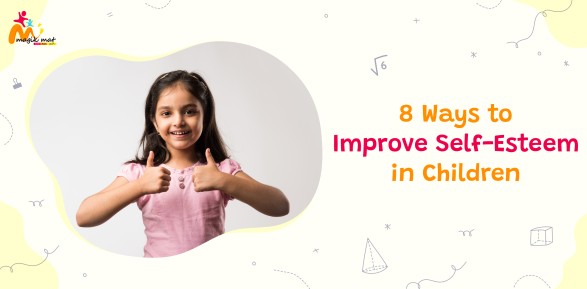Introduction
Are you worried about the difficulties that children might face due to low self-esteem as they grow? We all want our children to grow up to be confident and strong individuals. After all, a strong sense of self-worth can serve as a foundation for their future success and happiness. In this blog, we have provided 8 ways to improve self-esteem in children, not just by increasing self-esteem but also by laying the groundwork for a brighter and more confident future. This blog will show you how to be a great role model and help your child believe in themselves.
Ways to Improve Self-Esteem in Children
Have a Good Play Time Together
Playing with your child shows them that you like spending time with them and enjoy their company. Simply having fun with your child provides several benefits for both of you. When children feel that they are interesting and can connect with others, they can easily feel good about themselves and make friends, but engaging in healthy play boosts the chances of a child’s happiness while decreasing their risk of sadness and anxiety.
Be Liberal with Your Compliments
Always give your child a compliment. Children are frequently punished for their mistakes and rarely complimented for their good behavior. As a result, children might start to think that they will never meet their expected standards. Praise children whenever they do a good deed, no matter how small it is. This will help to encourage positive behaviors and boost self-esteem.
Provide Educational Products
Educational products help to improve children’s self-esteem by developing a sense of success through achievable challenges, emphasizing individual progress, and encouraging unlimited exploration. Educational products like Magik Mat help in this process. Magik Mat is a fun and informative learning product for children that provides an engaging and dynamic learning experience.
Magik Mat boosts children’s self-esteem by:
- Encouragement of success and achievement.
- Adapting to individual learning styles.
- Tracking progress and growth.
- Providing positive feedback and rewards.
- Cultivating creativity and problem-solving skills.
- Creating a positive and enjoyable learning experience.
Allow Your Children to Become Independent
Highly controlling parenting, sometimes known as helicopter parenting that limits children’s ability to complete activities independently, harms their self-esteem, and causes them to lose their independence. Allow children to figure out on their own how to communicate with teachers about any concerns, manage homework assignments, make sure their sportswear is packed and ready, and so on. When parents let children manage tasks on their own, it helps them feel more confident and gain essential life skills.
Avoid Labelling
Avoid using words such as lazy, naughty, or foolish when disciplining your children. Labels do not teach your child what is appropriate behavior and may lead them to fear that they will never be good enough. Instead, correct your children’s wrong behavior by explaining why it was inappropriate. Conveying your affection while expressing disappointment in their negative behavior can make them a little more aware of their activities.
Encourage Them to Create and Display Their Work
Allow your child to showcase their work around the house. Encourage your child to tell you about their work when they make artwork, write a narrative, or make a school project. Ask about what they want people to think or feel about their creations, as well as what they like best about them. Providing children with the opportunity to show off their creations or talk about them teaches them that their efforts are valued. It also indicates that their ideas and opinions are valued.
Express Unconditional Love
Knowing how much you love them gives your child a feeling of belonging and safety, which is essential for their self-esteem. Your unconditional love lays the foundation for all of the healthy and strong relationships they will have later in life. So, every day, hug your kids when you say goodbye, cuddle together and read a book, and show your affection. This foundation of love will support your child as they develop their social circles, choose friends, and build connections with colleagues later in life.
Influence Your Child
Your child is constantly monitoring how you handle yourself and interact with others. If you are self-centered, your child may learn to think the same way about themselves. Children will see how you react to your achievements and difficulties. If you fail and feel unhappy or disappointed, then comfort yourself and show that you still believe you are a valuable and lovable person.
Make Mistakes into Learning Opportunities
Make it clear that being human means making mistakes and not being perfect. Teach your child to see failures as chances for growth and improvement. Be patient with your child when they make a mistake. Make every attempt to turn disciplinary behaviors into opportunities for personal development for your children. This will improve your child’s confidence and indicate to them that making mistakes is not the end of life as long as they deal with them in a healthy manner.
Conclusion:
Helping to improve self-esteem in children is one of the most important things that you can do as a parent. Although it may require some extra effort at times, you must train your child for healthy self-esteem and success now and in the future. You shouldn’t expect your children to be perfect, and you shouldn’t expect the same from yourself. It’s acceptable if you sometimes fail to get everything right. Even if you make mistakes, as long as you try to express love and happiness to your children, you will help them feel more secure.
Frequently Asked Questions
What is positive self-esteem for kids?
Self-esteem is defined as loving oneself, feeling valuable, believing in yourself, and knowing what you are good at. When things don’t go as planned, self-esteem provides children with the confidence to attempt new things and try again.
How do children learn self-esteem?
Self-esteem comes from learning to accept who we are despite our flaws and still deciding to appreciate ourselves. Every child’s self-esteem increases with each successful interaction through encouraging words. It is important for developing the sense in children that they can handle their lives successfully.
How can I recognize signs of low self-esteem in my child?
The following are symptoms of a child’s poor self-esteem:
- Avoiding new experiences and failing to take advantage of possibilities
- Lack of confidence
- Can’t accept praise and exhibit worry or stress
- Fear of failure or embarrassment
- Feeling hated and unwanted
- Low levels of motivation and interest
- Talking about themselves in a negative way





